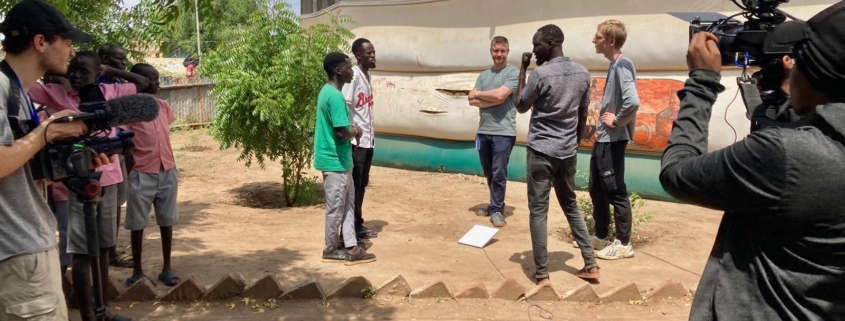Light in the Darkness: How Education Sparks Hope in Kakuma
In a world where children grow up without light, without technology, and without a clear path forward, TAG chose a different route — one rooted in hope and driven by education. In 2020, we built two Innovation Labs in the heart of Kakuma Refugee Camp, with a bold mission: to raise the bar of education in one of the world’s toughest places.
Five years later, Koen and Bram from the TAG team returned to Kakuma — not just to evaluate progress, but to launch a new initiative: the Solar Light Project. This time, their journey was followed not by a Hollywood film crew, like the one behind Heroes for the Planet, but by a passionate team of Swiss, French, and Kenyan filmmakers. A new documentary is now in the making. Stay tuned.

The TAG team meeting each other during the first day
Kakuma’s roads are both literally and figuratively bumpy. Reaching our Innovation Lab Schools requires a UN jeep, traveling from the compound through harsh terrain. With malaria and cholera always nearby and the scorching heat pressing down, progress is hard-fought. Yet that’s exactly what our African TAG team has achieved. Franco, Simon, and William have been leading a wave of new programs — launching ICT clubs, art and design sessions, coding classes, and most recently, a Climate Action Hub to support TAG’s environmental work and foster sustainable innovation among refugees.
Over the past five years, this school has transformed: trees have been planted, a water tank installed, a school garden cultivated, fast internet provided, solar panels added, and 100 laptops deployed. It has become a true community hub — a place where students thrive, people connect, and ideas turn into real-world solutions.
What began as a seemingly ordinary Tuesday became a day of deep impact. Students in Belgium and Kakuma were both working on solar lights — a shared STEM project exploring how small solar panels and batteries, charged during daylight, could offer sustainable light at night. In Kakuma, the solar lights were attached to water-filled plastic bottles to amplify the brightness.


Students at both sides creating their solar lights
What the Belgian students didn’t know was that most homes in Kakuma have no access to electricity. For their peers in the refugee camp, these lights weren’t just a project — they were life-changing.
We met one student who had been stung by a scorpion the night before. With no nearby medical services, he had treated the wound with toothpaste. Still, he showed up to class — determined to build his own solar light. In just three hours, all 56 students created their own lights. They soldered, used glue guns, and cheered each time a light flickered on. But the highlight was still to come: a live virtual exchange with the Belgian students over Zoom.

The Zoom call with Kakuma and Belgian students

Promise proudly showcasing her solar light
They began by sharing stories about their countries, hobbies, and daily lives. Then, they proudly presented their solar lights — explaining what light meant to them. And then, something magical happened: as they shared music from their cultures, they began singing and dancing together, separated by continents but united in joy.


Students at both sides started dancing during the virtual exchange
Still followed by the film crew, we visited the homes of three students. Their parents saw — some for the first time — the impact their children were having. We saw James’ sand-walled home illuminated for the first time. And we listened as Promise spoke about how this simple light would allow her to study at night and dream bigger dreams.

James proudly showing the solar light to his parents
The Solar Light Project is just one of many initiatives TAG has led in Kakuma in recent years. During this visit, Bram also taught 110 students about Artificial Intelligence — showing how AI can help them build knowledge about innovation and climate change. This matters deeply in a place like Kakuma, situated in the Kenyan desert, where some of the world’s first climate refugees now live.

Team TAG. Meet Angelo (left), the newest member of Team TAG, joining us to drive innovation and empower climate action through education.



